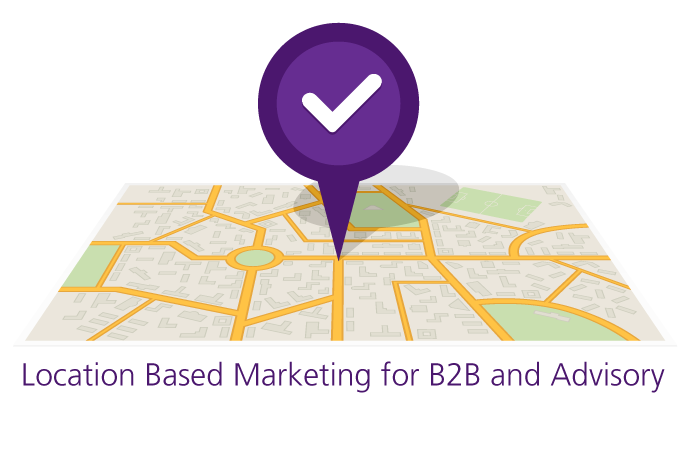![Location Based Marketing B2B Advisory]() Why Companies Care About Location-Based Data
Why Companies Care About Location-Based Data
A recent article from Fast Company disclosed that both Yahoo! and Apple are very interested in Foursquare’s data. Foursquare is a database with more than 55 million places around the world and serves as the “location layer” in other apps like Instagram and Vine, but why are Foursquare’s insights so important to companies? The article notes:
“Foursquare’s location database is more than simply a list of venue names and addresses. It’s not just location data that Foursquare is collecting: The company knows when you check in to a venue, whether your friends join you there, and often what you did before and after. The Yellow Pages knows the location of Blue Hill restaurant, Grom Gelato, Washington Square Park, and Third Rail Coffee; Foursquare knows how they’re all connected. Perhaps it’s common for users who check in to Blue Hill to head to Grom afterward, before grabbing coffee following a stroll in the park—Foursquare knows this information from its check-ins, so it can offer users personalized recommendations.”
Because of its ability to predict user activity based on actual documented, prior consumer activities, companies are becoming more and more interested in location-based marketing. As a recent Social Media Today article notes, “Mobile location data and the behavioral insights it reveals can deliver mobile audiences based on actual consumer activity. Facebook can infer fans who have interest and a positive attitude about a brand, but location-based advertising can deliver actual shoppers using both real-time and historical data, and for example, show us where this user actually shops and eats. This translates into real customer results.”
Mining Location-Based Data for Market Research
Using location-based data as a basis for market research can be very valuable because the more you understand your prospective clients—who they are, what they do and why—the better you can tweak your marketing efforts to reach them. This video featuring Aaron Strout, author of Location-Based for Dummies, sheds some light on why companies should care about location-based marketing. Strout says that location-based is the third element in what he calls the holy trinity of data. This trinity includes demographics (sex, age, etc.), day parting (what times of day people are viewing things) and location base (who you are, where you are and when).
How to Leverage Location-Based Marketing for B2B Advisory Businesses
Knowing what your clients are doing, at what locations and at what times are valuable pieces of data for restaurants, retailers and other consumer-based industries, but what about B2B? While your customer base may not be near your business geographically on a day-to-day basis, there are ways to leverage location-based industry related events and within professional group affiliations that can help you engage current clients and attract new ones.
Identify Prospects and Facilitate Leads: With the data you get from location-based research, your company can find out a lot about a prospect. Location-based gives us a better perspective on personas because it lets us see where actual people spend time and when. An article from Hubspot reveals an important point about using location-based tactics:
“Sales and marketing teams for B2B companies traditionally have profiles and personas for their customers. They have an idea about their personality, what motivates them, the types of activities they like to do. A significant part of who a person is, are the places they go and the people they spend time with. If you are in the business of selling software to engineers, then you can find the places in your sales area that engineers are likely to frequent and use location-based applications as a way to connect with them. “
Incentives: If several of your clients regularly visit a local coffee shop, let’s say it’s called “The Grind,” it might make sense to partner with them. On Foursquare, businesses can offer incentives for checking in. If you partnered with “The Grind” the check-in incentive could say, “Free latte with your third check-in! Brought to you by “Your Company Name and Website.” This would be a great way to keep your company top-of-mind for current customers and to attract new ones. Think how this might work at an out-of-town trade show. . .
Sponsorships & Events: Sponsoring events is another way to leverage location-based marketing for B2B. If there is an upcoming event in which many of your clients or potential clients will be attending, your company could partner with the venue and/or whoever is putting on the event. Have banners or booth cards made that say, “Check in on Foursquare (or Facebook, Google+, Yelp, etc.) and receive one free drink from the bar, a free gift bag, some other incentive—sponsored by “Your Company Name & Website.” Using check-ins creates brand awareness and buzz around your company. If people check in and share it on Facebook, Twitter, Google+ or any other social network, their contacts will see your brand as well.
Check In With Clients: By checking-in (as yourself or as your company) to places that current and potential clients are, you can show that your company is actively involved in happenings in your industry. This applies not just to coffee shops, but technology hubs, common client association events and the like. Don’t forget to follow your clients and interact with them as well. A recent Hubspot article notes, “to ensure the most exposure from these checkins, follow your employees, existing clients, potential clients, industry partners, competitors, and other B2Bs of interest to your business. They’ll be more likely to follow you in return if you’re active on the particular network, thus seeing where you’ve recently checked in.”
Best Practices for Company Account Check-ins: If you have a company Instagram or Vine account, both allow you to add the Foursquare location with the image or video which you can then send to Twitter or your Facebook Company Page. If you want to check in on Facebook with your company page, you cannot do so with the official Facebook mobile app. You would need to check in using your personal Facebook account and just mention that it involves your company or you can get around this by logging in to Facebook through your mobile browser and checking-in on your company page that way. With Foursquare, you could create an account for your company and check in, then send the check-in it to your Facebook Company Page and Twitter.
Social Media & Brand Awareness: Another aspect of leveraging location-based for events is telling your audience where you will be and what you’re up to. If you check in as your company on Foursquare, or check in through your Facebook Company Page you can let your audience know what’s going on with your company.
With this particular example, someone might comment on your check-in saying, “We’re here, too!” or “I didn’t know about this event, tell me about it!” Just another way to keep your business top-of-mind and engage with your audience. Social media paired with a specific location gives your audience an additional perspective on what your company is all about. P.S. As mentioned above, you cannot check-in as your Facebook Company Page from Facebook’s mobile app, the above example would need to be done from logging into Facebook from your mobile browser or from your computer.
Network and Build Your Personal Brand: If you notice that someone checks in at an event you’re attending, you can see who they are, then connect with them on LinkedIn with a message like—”Hello! I noticed that you were at an event I attended via your Foursquare check-in, and I also saw we both know John Smith, so I thought we could connect on LinkedIn. I work with a lot of people in your industry and perhaps we could do some work together in the future.” I don’t know about you, but including a reason (common affiliations, potential partnership) and pointing it out in a connection request just makes more sense than sending a generic request (don’t make the potential connection work to figure out why you should connect).
Claim Your Business: Many companies have not claimed their business listings on Foursquare, Facebook Places, Google Places, or other location directories. Don’t miss this opportunity to put your information like phone number, website url, twitter handle, physical address and business hours. From a branding perspective, it’s important to claim your listing to be sure that your listings are complete and that they fully express your brand. Find out how to do this for Facebook Places, Google Places (shows up on Google Maps), Bing Places (used in Facebook Graph Search), Yahoo Business Listings, Foursquare, Yelp (used in Apple Maps) and any other business listing.
SEO: Location-based optimization through claiming your business listing can also aid in SEO and page rank. For example, by claiming your business on Google Places, you will benefit from a higher page rank within the Google Places section on the search page. In addition, encouraging reviews on your Google+ page will boost your page rank within Google Places as well.
Overall, utilizing location-based marketing, as well as claiming and optimizing your business listings across the web will enrich your web presence, increase your brand awareness and your company’s credibility. With a little research your company could benefit from integrating location-based into your marketing strategy.
by Tara Urso, Social Media & Marketing Strategist
The post Location-Based Marketing for B2B & Advisory appeared first on Insight180.























